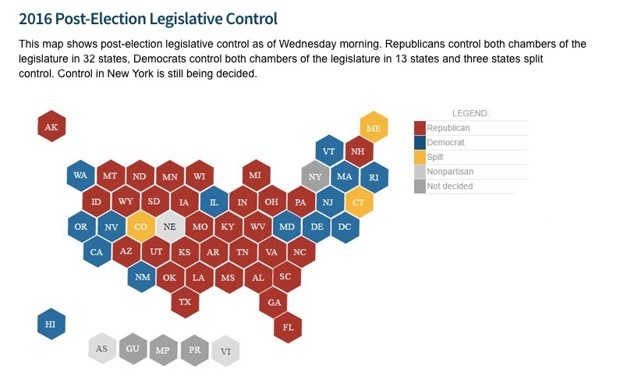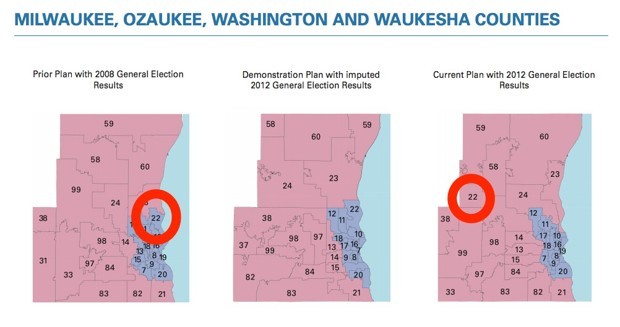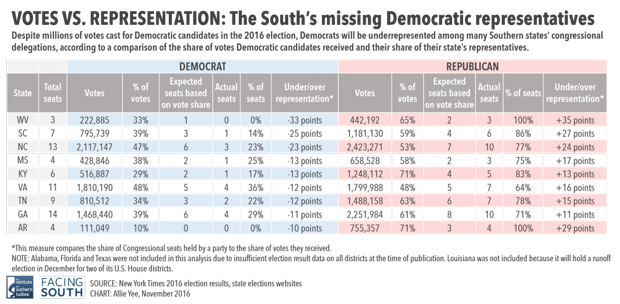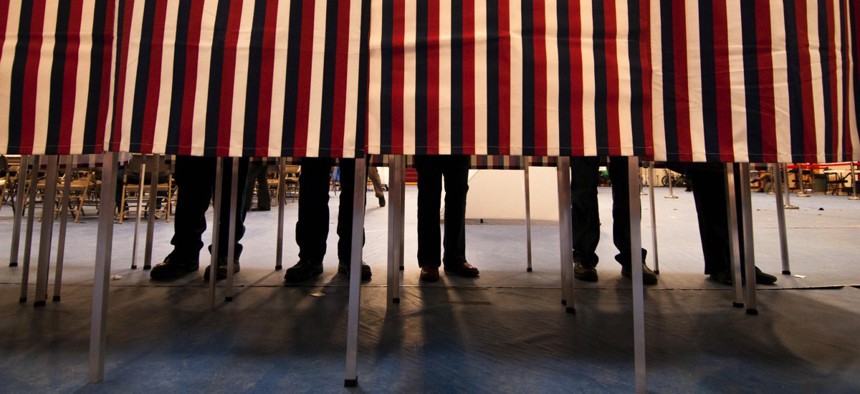Connecting state and local government leaders
To resist the current political peril, just boost the urban voter turnout, right? Unfortunately, it’s not that simple.
That cities’ voter-turnout game is mad weak is an unassailable truth. The urban sector may do a lot of things better than rural and suburban areas, but getting constituents to the polling booths is not one of them. There are plenty of explanations for why that is, but there is no good excuse for why that should remain the norm.
Writing in The Philadelphia Citizen, former Next City editor Diana Lind has performed a great service in not only reminding urbanists that their Get Out The Vote (GOTV) work needs improvement, but also in providing worthy solutions. Her ideas around augmenting the capacity of community development corporations (CDCs) and the urban innovation sector to take the lead on GOTV and election-data gathering should be pursued pronto. The Department of Homeland Security’s recent announcement that it will now take on “ election infrastructure ” as one of its critical functions should further encourage this.
Increasing political participation can be nothing but good for that enfeebled venture called democracy. If cities truly are the laboratories for democracy , their voting records should reflect that. The fact that the incoming president was elected on the strength of exurban , rural and small-town votes should put even more fire under city voters’ asses. And if that election did nothing, it exposed the political , racial and economic resentment felt in those small towns for their coastal city neighbors. The only way to counter that is for urbanites to blitz the voting booths, writes Lind :
There is a relatively easier way to solve the problem that is distorting American political culture: Ensuring urban residents vote at the levels of their suburban and rural counterparts. Getting out the vote is not a sexy topic, but it will become increasingly important as the political landscape continues to shift. … But unlike figuring out how to bring back manufacturing to the Rust Belt or how to revise the tax code for greater equity, these are relatively easy problems to solve, especially in this age of urban innovation.
This is definitely worth investing in, but there should be no illusion that this is an easy solution. There is a huge bug baked into the electoral system— gerrymandering —that complicates the narrative that we can simply city-vote our way into progress.
Gerrymandering is the process through which legislative districts are crafted by sorting and grouping voters in ways that advantage or weaken one political party over the other. It’s a very real way to rig elections , and it happens all the time. It functions not only for partisan purposes but also for race when minority voting populations are packed into a small number of districts , or scattered across districts that don’t share their political interests to weaken their political influence.
And it’s because of gerrymandering that major cities have not enjoyed much political clout within the states that host them. Ever wonder why your city’s bridges can’t get fixed or can’t get that fleet of clean energy buses, but you keep seeing new lanes added to suburban highways? It’s because your city is likely condensed within a small minority of state legislative districts that are far outnumbered by the districts that represent rural and outer-rim suburbs.
Those non-city districts typically are loaded with conservative voters who care little about density or public transit or affordable housing. Indeed, many moved to these exurban settings specifically so that they do not have to entertain such urban entreaties.
Every ten years, after Census figures are released, whatever political party that reigns in your state gets to take that data to carve out legislative districts to their own pleasing. This happens with city council and school board districts too. Naturally, the political party that controls the redistricting process will draw new district borders to sort more of their own loyal voters into a majority of districts, while confining enemy voters into fewer districts, all in the name of maintaining power over policy.
Cities are often decennial losers in these processes. They may hold the edge in population, but they can’t match the land mass of their suburban and rural complements, where the borders game is quite advantageous. Republicans currently control the state legislatures in 32 states —constituting majorities in both state House and Senate chambers. The major cities in these states have limited influence, since they normally are run by Democrats .

This kind of partisan gerrymandering is only getting worse, according to the Campaign Legal Center , a nonpartisan DC-based nonprofit that recently won a landmark gerrymandering case against Wisconsin . In that case, Republicans created district maps in 2012 that awarded themselves 60 of Wisconsin’s 99 legislative seats, even though their candidates only won 49 percent of the vote. The city of Milwaukee was left isolated in that map, with its northern, inner-ring suburbs split up and absorbed by new Republican districts, effectively eliminating a solid Democratic seat from that area .
This can be seen in the image below. District 22, once a blue seat on the coast of Lake Michigan in 2008, gets swallowed in 2012 by Districts 23 and 24, and then somehow ends up far west of Milwaukee, now red as a result of the gerrymander. It’s border games like that that help weaken Milwaukee’s overall political influence in the Wisconsin legislature.

A January 9 report from the Campaign Legal Center analyzing the impact of gerrymandering across all states in 2016 led to their finding that “the redistricting plans in the post-2010 cycle evidence more extreme partisan gerrymandering than any other decade in modern American history.”
Lind’s article argues that “[l]arger numbers of urban voters would have dramatic effects on state-level representation, such as senator and governor positions, which in turn would affect national policies as well as who gets elected as president.” But, as Wisconsin’s experience shows, it’s not quite that simple.
“It is true that if you had more turnout from cities that it could effect statewide races, but in Wisconsin it would not have any effect on the state legislature precisely because the state gerrymandered it to be that way,” says Ruth Greenwood, the Campaign Legal Center’s deputy director for redistricting. “So if you talk about Milwaukee having low turnout, most of the districts there are either packed toward the center or cracked along the edges of Milwaukee county and the other counties. You could run up the turnout rate as much as you’d like, but it wouldn’t make a difference.”
Maxing out the urban vote could help elect governors, but even governors get constricted due to the gerrymandering curse, because they get checked by legislatures. Consider the situation in North Carolina, where the powers of the newly elected Gov. Roy Cooper, a Democrat, have been severely restricted by the supermajority of Republicans in the legislature—a supermajority secured via gerrymandering .
If that wasn’t enough, North Carolina’s Republican legislators passed several laws that place state and county election boards under their control , which would allow them to create even more rules to mold the electorate to serve their bidding. Courts have temporarily blocked those laws , but if they ultimately hold up, that’s the kind of political vise-grip that proves difficult for cities to vote their way out of.
And it’s a problem that’s surging across the South , limiting the powers of Democratic governors like Louisiana’s John Bel Edwards and Virginia’s Terry McAuliffe. As the North Carolina-based Facing South blog points out :
The consequence of gerrymandering in the South has resulted in a significant underrepresentation of Democrats among the region's congressional delegates. In 2012, 41 percent of Southerners voted for a Democrat, but Democrats made up only 29 percent of U.S. representatives from the South. That meant Southern Democratic voters were four times more likely to be underrepresented in Congress than the national average.
The gap persists in 2016 in many Southern states, according to a Facing South analysis of the election results. In West Virginia, for example, one-third of the state's voters cast a ballot for a Democratic candidate, yet there are no Democrats among the state's three representatives. Meanwhile in South Carolina, nearly four in 10 votes in U.S. House races were cast for a Democrat, yet only one out of the state's seven representatives (14 percent) is a Democrat.
The bulk of those Democratic votes are coming from cities, meaning they are not getting the representation they deserve in those Southern assemblies. Which means, as cities like Charlotte are currently realizing , the governor can’t always save them. Not to mention, gerrymandering is an ipso facto culprit for depressing turnout —when people feel that races are uncompetitive or unfair, they figure their vote won’t mean anything anyway, and stay home .

But even without gerrymandering, increasing urban voter turnout is still no easy task. There are already plenty of institutions in the city that regularly do GOTV: churches, labor unions, fraternities and sororities, the many branches of the League of Women Voters and the NAACP. (Remember ACORN , which was targeted and dismantled specifically because it was turning people out to vote?)
It’s not that they’re ineffective because they’re not running a sophisticated enough ship. Rather, it’s the intractable problems of economic inequality and racism that keep getting in the way. When states cut early voting periods , or don’t offer them at all, this reduces the opportunities of the urban voter who’s working two or three jobs to make it to the polls. When states and counties close or reduce the number of polling locations , it makes voting tougher for the urban worker with no car. When churches set up “ Souls to the Polls ” GOTV drives, to bus congregants to the polls after church service, state legislatures undercut them by banning voting on the Sunday before Election Day . Laws that require people to produce ID at the polls , but not when voting absentee or via mail-in ballots, again privilege white, non-urban voters .
Race is totally implicated in all of this. Felony disenfranchisement disproportionally removes more voters from city rolls than non-city rolls, and simultaneously inflates the political power of the rural and exurban counties where prisons are located. Racism itself kills and jails enormous numbers of would-have-been voters and impacts election outcomes in ways we can’t even see.
This is not at all to say that strengthening cities’ resolve around bolstering voter turnout is an unworthy goal. There is a lot that CDCs and urban innovators can learn from groups like the NAACP on what has and hasn’t worked in the GOTV realm, and we should get that going, like, yesterday.
But urbanists can’t go into this thinking it’s a cakewalk, if for no other reason that political power doesn’t peak at the city border. Gerrymandering works to make sure that it doesn’t and won’t. Until that’s resolved, along with the other classist and racist viruses implanted in the electoral system, the city vote will remain in peril.
Brentin Mock is a staff writer at CityLab, where this article was originally published.

NEXT STORY: Iowa Gov. Details $110 Million in Budget Cuts; Hope vs. Reality in Olympia



